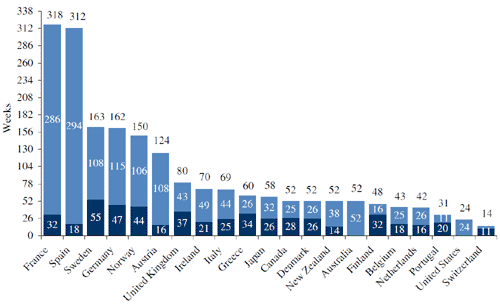•Press Release Workers
August 30, 2008 U.S. 21st out of 21 economies in the generosity of leave for two-parent families
For Immediate Release: August 30, 2008
Contact: Alan Barber, (202) 293-5380 x115
WASHINGTON, D.C.- As millions of Americans prepare to celebrate Labor Day by spending the day off with family and friends, a new report from the Center for Economic and Policy Research (CEPR) examines the parental leave policies of 21 high-income countries and finds the United States to be the least generous.
 The report, “Parental Leave Policies in 21 Countries: Assessing Generosity and Gender Equality,” focuses on the level of support provided to parents under national parental leave polices. The United States finishes 20th out of 21st when it comes to the total length of leave guaranteed to a two-parent couple — 24 weeks. Only Switzerland provides less –14 weeks — but 11 of those weeks are paid. The United States finishes last among the 21 countries when it comes to the generosity of paid leave. Neither Australia nor the United States have minimum standards for paid leave, but Australia does give new parents a $3,000 “baby bonus”.
The report, “Parental Leave Policies in 21 Countries: Assessing Generosity and Gender Equality,” focuses on the level of support provided to parents under national parental leave polices. The United States finishes 20th out of 21st when it comes to the total length of leave guaranteed to a two-parent couple — 24 weeks. Only Switzerland provides less –14 weeks — but 11 of those weeks are paid. The United States finishes last among the 21 countries when it comes to the generosity of paid leave. Neither Australia nor the United States have minimum standards for paid leave, but Australia does give new parents a $3,000 “baby bonus”.
“The United States has the least generous parental leave policies of all 21 economies compared in this study,” said report co-author and CUNY Graduate Center professor Janet Gornick. “We pay a high price for our poor policy, though, because parental leaves improve the health and well-being of children and their parents and paid leaves provide families with crucial economic support at such an important time.”
While the U.S. Family and Medical Leave Act (FMLA) does set a minimum standard for parental leave, that leave is unpaid. Moreover, about 40 percent of U.S. workers are not protected by the FMLA. The FMLA does not cover workers in smaller establishments and also excludes employees with less than one year on the job.
“The FMLA falls well short of international best practices,” said Rebecca Ray, a co-author of the report. “One of the biggest shortcomings is that current law makes no provisions for paid leave. Some employers do pay, but putting the full cost of parental leave on individual employers is neither fair, nor efficient.”
The United States fares better when it comes to gender equality, falling right in the middle of the 21 countries in the study. The FMLA guarantees identical leave to both parents on a “use it or lose it” basis — fathers cannot transfer unused parental leave to mothers — which gives incentives to fathers to spend more time in caregiving roles. However, the fact that FMLA leave is unpaid discourages fathers, often the higher earners, from taking the leave to which they are entitled.
The study identifies six countries with “best practices” for parental leave: Finland, France, Greece, Norway, Spain, and Sweden. These countries all employ the following broad policies:
The full report can be found here.
###
The Center for Economic and Policy Research is an independent, nonpartisan think tank that was established to promote democratic debate on the most important economic and social issues that affect people’s lives. CEPR’s Advisory Board of Economists includes Nobel Laureate economists Robert Solow and Joseph Stiglitz; Richard Freeman, Professor of Economics at Harvard University; and Eileen Appelbaum, Professor and Director of the Center for Women and Work at Rutgers University.